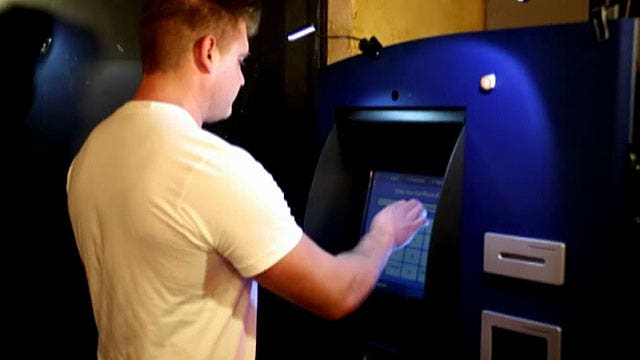First Bitcoin ATM Unveiled on Capitol Hill
Bitcoin is headed to Washington.
The first ATM for the cryptocurrency will be unveiled to members of Congress Tuesday afternoon.
Made by Robocoin, the 750-pound ATM was first introduced in Vancouver, B.C. in October 2013, according to its blog. It trades the cryptocurrency for cash, and cash for bitcoins. To make a transaction, customers must provide an email, their palm print, a government identification, their face and cash. The verification process is in three steps, according to the company’s website.
The unveiling comes two months after MtGox, the largest bitcoin exchange, lost $620 million in bitcoin and filed for bankruptcy protection in Japan.
There are currently 10 machines overseas, according to a release from Robocoin, and one in California. Robocoin operates with the Bitstamp and Vault of Satoshi exchanges, and is working to integrate with others in the future. Each ATM retails at $20,000, and the company says it has sold 100 so far.
Robocoin CEO Jordan Kelley and Robocoin Co-founder and Chief Technology Officer John Russell will be at the unveiling Tuesday where members of Congress and the media can buy, sell and enroll in a bitcoin wallet account.
Those who have a bitcoin wallet or account can send their bitcoins to Robocoin and have their cash out within 10 minutes. Currently, bitcoin users have to go through individual online exchanges to cash out, which can take days.
Kelley says the businesses that buy and operate the ATMs have to adhere to anti-money laundering laws. “We’ve replaced the bank teller with hardware and software,” he says. “We reduced the time to less than five months and we removed the human error.”
When customers visit the machine, they enter their phone number and receive a text message to verify their identity. They then create a pin number and scan their palm, and then place their government ID into the scanner.
“Then the customer stands in front of the kiosk and takes a photo. We send those two photos to the human verification team. We match that they are the same., and then we send the customer a text message. The customer can then go back to the machine to buy and sell bitcoin,” Kelley explains.
Bitcoin was introduced as an open-source software code in 2009, and has since grown into a $1 billion industry. The digital currency is especially popular among those in the tech community.
The currency remains unregulated and February’s events have increased calls for government intervention. Some lawmakers are open to treating bitcoin more like cash with Rep. Steve Stockman, (R-TX) , introducing the “Virtual Currency Tax Reform Act” on Monday.
If enacted, this legislation would change the tax status of virtual currency. Last week, the IRS declared bitcoin would be taxed as property.
Stockman visited the New York City Bitcoin center Monday to discuss the legislation further. “This is a nascent industry. Along with 3-D printers and nanotubes, cryptocurrency is the future. We need to encourage it, not discourage it. There is risk associated with every budding industry in America,” he said in a release.
The IRS currently treats bitcoin as property and not a currency.
FBN’s Jennifer Rose contributed to this article.




















